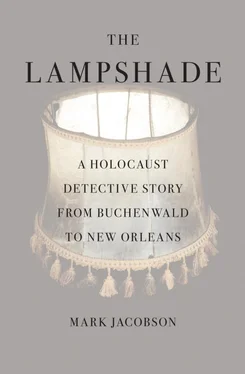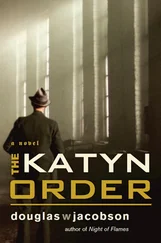My voyage to Buchenwald began at the Crossroads. The Crossroads Bar, that is, then located at 224 Sunflower Street in what passes for downtown Clarksdale, where, on the aforementioned breathlessly hot July afternoon in 1995, I first encountered Raymond Henderson, who, along with everyone else, calls himself Skip.
Thinner then, raw-boned almost, his long, straight brown hair flung about with each herky-jerk gesture, Skip was standing behind the rutted wooden bar, talking six times faster than anyone else in the entire state. Hearing his jackhammer diction, so discordant compared to the slurred molasses patter of the locals, I asked, “Hey, you’re not from here, are you?”
“Fuck no,” Skip replied, his Sicilian—Scotch-Irish roots unconcealed. “I’m from New Brunswick, New Jersey.”
Sliding forth a bottle of Blackened Voodoo, the preferred dark brew of the Crossroads, Skip, who started the bar in an old warehouse with the dementedly romantic notion that he’d give the few remaining Clarksdale musicians a place to play, continued his harangue to the two or three assembled drunks. As usual, Skip was exasperated by the shortcomings of his fellow human beings. This particular rant involved the long-abandoned Clarksdale railway station that he wanted to turn into a blues museum. It was at Clarksdale Station that Muddy Waters, who’d grown up picking cotton on Stovall’s plantation, laid his money down at the colored people’s ticket window (located in the baggage department just so no one forgot his place) to ride the Illinois Central Railroad to Chicago, where he and other Southland bluesmen would plug their instruments into the electric socket and shake the world. This made Clarksdale Station an important place not only in the annals of the blues but also in the overall account of African-American migration northward following the demise of the sharecropping system, Skip explained loudly and not for the first time.
The train station project grew out of Skip’s larger mission in and around the Mississippi Delta. Back in Jersey, before the breakup of his first marriage, he split his time between his social work day job and his equally time-consuming passion for the collection and preservation of classic, often neglected, elements of pop culture. In the 1970s and ’80s his social work function took the less-than-ideal form of high school counselor/truant officer (“a school pig,” in the vernacular), a hectic position for which the state of New Jersey felt the need to issue Skip a badge and a .38 revolver. It was not a job guaranteed to ensure popularity, and one time Skip pulled in to the school parking lot to see eight-foot-high letters on the building wall spelling out “Mr. Henderson Is A Big Prick.” As Skip walked by, the Polish janitor who was scrubbing off the graffiti seethed, “You—you make them do this.”
Skip took refuge in his guitar business, restoring and selling vintage instruments, usually his beloved Fender Telecasters and Stellas. In this capacity he learned that many of the greatest blues artists, like Charley Patton, Sonny Boy Williamson, Mississippi Fred McDowell, and Memphis Minnie, geniuses all, were buried in unmarked graves.
To Skip, this was an outrage. A national shame. It could not stand. Establishing the Mount Zion Memorial Fund, he started calling successful white singers like John Fogerty and Bonnie Raitt to remind them that they could relieve part of their acknowledged debt to these bluesmen and -women by paying for their tombstones. R. Crumb, known to Skip through the obsessive record-collecting world, contributed a drawing to crown the obelisk dedicated to Robert Johnson at Morgan City, Mississippi. Skip had the Crumb drawing printed on a piece of porcelain, which he affixed to the monument. When the medallion was stolen, Skip made another one. When that one was taken, he had the picture engraved in the stone. This was a lot of work, especially in light of the fact that every blues fan knows Johnson’s body is not to be found at Morgan City. Neither are the singer’s remains buried at the two other Mississippi locations that purport to be his gravesite. In fact, despite leaving behind some of the most evocative American music ever recorded, no one has ever ascertained what happened to Robert Johnson or his mythically sold soul. [4] The monument Skip Henderson helped erect at Mount Zion Church was never intended to mark Johnson’s actual burial spot. The other “gravesites” are at the Little Zion Missionary Baptist Church in Greenwood, Mississippi, and near the Payne Chapel Memorial Baptist Church in Quito, Mississippi. Robinsonville, a small town near the Tennessee border where Johnson lived for some years, is now home to several legalized gambling casinos with lounges mostly featuring second-string country artists, an irony the soul-selling Johnson might have appreciated.
The success of the gravestone project was followed by the difficulties with the train station. The day I met him, Skip was railing that this was sheer Neanderthal prejudice. Only the week before he’d presented his proposal to the Coahoma County supervisors, detailing how the train station would not only memorialize the area’s invaluable cultural legacy but also bring considerable tourist dollars to the chronically depressed local economy. Clarksdale, in case anyone on the board had failed to notice, was a mess. Over on Issaquena Avenue, the black neighborhood’s main drag, the roof of the movie theater had blown off. A giant ailanthus tree, at least fifty feet tall, was growing up right between the derelict seats. Many lived without indoor plumbing. Couldn’t an influx of blues-loving Yankee greenbacks help that? The board, all white, was not impressed.
“Let me tell you something, son,” said one member. “There ain’t nobody we know who is gonna drive all the way over heah to hear about some Negro man playing a ghee-tar. Your project is just for the blacks. I can’t support it.”
It was insane, this tyranny of the skin, Skip declaimed that hot day in Clarksdale, the way the outermost layer of a man was all that could be seen and judged by other men. When would the decent and reasonable impulses of the species, the beating heart of brotherhood, finally break through the surface that kept us apart? It was an admirable but futile screed, as Skip and everyone in the bar that day, a motley assemblage that included a drunken blues singer who called himself Rocking Daddy Juking on the Corner, or “R.D.J.C. for short,” readily agreed. You could scream all you want about the way skin—what could be seen from the outside—had caused so much misery in this world. But it was a hard thing to get around. It was something you were born with, as dictated by God, or some trickster devil juking at the Crossroads who just liked to stir things up.
One thing that could be done, however, was to mess with it. To paint upon it. Make yourself a canvas. To declare that no matter what anyone else thought, the bigots and those who might think you old and ugly, this skin, this personal parcel of living real estate, belonged to you, no one else. This brought up Skip’s tattoo, the most remarkable one I’d ever seen, a bit of ink that would almost have certainly attracted the attention of Dr. Erich Wagner and Ilse Koch.
“Weird tattoo you got there,” I mentioned to Skip, referencing the image on his right bicep depicting an astronaut, wearing a NASA suit, floating free beside a Gemini space capsule. “Who’s that?”
“Who?” Skip replied, ever peeved at the ignorant, poking an index finger at his upper arm. “That’s Ed White, my hero .”
“Ed White, the astronaut, is your hero?”
“First American to ever walk in space. Ed fucking White.”
It was at this point that Skip’s version of the Ed White spacewalk diverged from the official NASA account. As per many published stories at the time, Skip believed that when White made his historic jaunt on June 3, 1965, the astronaut was subject to a condition known to scuba divers as being “narked,” or so one theory goes. This occurs when the change in external pressure makes nitrogen more soluble in the body tissues, causing the diver, or in this case the spacewalker, to experience sensations not unlike ingesting several drinks or breathing nitrous oxide. In other words, while floating amid the boundless expanse of the universe, Ed White was stoned out of his mind.
Читать дальше












